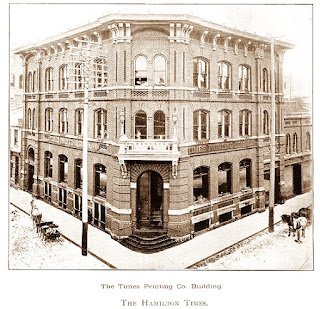1895 - Times Reporter Randomly Reporting
A Times reporter reporter writes randomly about what he sees when he left the office one day:
“The writer takes a
deep interest in the condition of the workingmen, their field of influence and
the results of their labors. To a close observer who studies human nature, it
must afford matter for thought to see a man of years, with bent form and snow-white
hair toiling with pick and shovel for his daily bread. It must appeal to the sympathy
of the passerby when he sees the results of an improvident life, the slave of
intemperance or the heir of misfortune.
“But the dignity of toil
is evidenced by many light hearts and willing hands. In conversation with a
corporation employee recently with whom I passed a cherry word, I said ; ‘Pat,
I believe you are about the most useful man on the roll, and are always doing
some good, useful work.’
“He looked up at me and
replied in his rich Irish brogue ; ‘Thank you, sir; when I makes a job, I makes
a job, and it’s a good job now.’ Surely
Ruskin could not have expressed the importance of the dignity of labor in
comparison more forcibly when he said, ‘First know what you have to do, then do
it.’
“An amusing scene occurred
on a King street car. A passenger got on at John Street, going east. When the
conductor presented the fare box, the lady produced her transfer ticket. The
conductor politely informed her that her ticket could not be accepted because
she should have waited at the corner of James Street. This was the rule of the
company. She insisted that she was right. A spirited dialogue ensued. A friend
explained the matter and paid her fare. In her excited frame of mind, she arose
rang the bell and left the car, saying she would walk home rather than be
imposed upon.
“Passing along Vine
Street a few days ago, an observer saw a dray load assortment of miscellaneous
household goods being transferred to a new place of abode. On the load was a
carboard box carefully tied to secure the contents. As the box was handed from
the wagon, the owner of the goods remarked, ‘Handle this with care, it contains
my wife’s wedding bonnet.’ They had been married for a score of years and this
high-priced relic had survived the vastitudes of similar movings and in the
interval had not been sacrificed to the dictates of fashion, but carefully reserved
as a memento of former grandness.
“The writer often
studies character from the faces of fellow passengers on his railroad journeys
and finds material for many a reverie. Joy and gladness, or the outward
expression of sorrow and sadness, are depicted on many a countenance.
“A happy party occupy
one end of the car. They are tourists and are making a circuit of the globe. Everything
is strange to them. They enjoy the freedom of the entire care and produce at
intervals fruits and sweet meats from prodigious hampers. The guide book is
used to locate points of reference. There are the typical professional men, a judge
charging the jury on an important case, the astute politician who seeks to make
himself secure for a return to power, the man of leisure who is on a pleasure
bent and the keen-eyed businessman who is a prominent figure on the stock
exchange. One of the passengers is conspicuous by his presence. He has a long
face and solemn features. He carries a leather satchel upon which are printed
in large letters on the outside ‘Christ died for the ungodly,’ and ‘Prepare to
meet your god.’ Does this man exemplify the truth of the modern idea of
Christianity which, if it does anything for a man, it makes life happy and
joyful?
“Of all the passengers,
the little children claim the most attention and their smiling faces remind us
of our own dear ones at home.
“The express comes
flying into the station and e take the electric car are are soon in the busy
world again.”
“A Few Random Snap Shots”
Hamilton Times. January 14, 1895.




Comments
Post a Comment